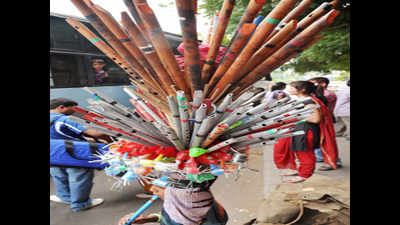- News
- City News
- lucknow News
- Note ban mutes Pilibhit flutes; production may stop in 2 months
Trending
This story is from February 14, 2017
Note ban mutes Pilibhit flutes; production may stop in 2 months

(Representative image)
BAREILLY/PILIBHIT: For Iqrar Rizvi, playing the flute has been the only way that life could be. Sitting on a low stool down a narrow alley at Shadab Khan locality here, Rizvi, a fourth-generation flute maker, said he will be forced to give up his vocation and take up a more “feasible” business if sales do not rise in the next two-three months. In the past three months post demonetisation the balance between demand and supply of flutes has gone awry, forcing artisans to sit idle.
Government apathy and onslaught of cheap, imported products had already ensured a gradual decline of families involved in manufacturing flutes in the past five years — from 200 to only 50. In the absence of manufacturing orders from middlemen based in metro cities post note ban, the industry is staring at a permanent closure.
“Pilibhit boasts of one Union minister and two state ministers but they have done little to uplift our condition. Though we met all three ministers several times, none of them showed any concern for us,” said Rizvi. He has just returned to Pilibhit after touring several cities of Maharashtra and Madhya Pradesh in a bid to get some orders.
“I met clients personally but was able to have get a handful of orders. Many also said that they will be able to clear earlier payments after March. I was forced to lay off 12 artisans two months back because I had no money to pay them. If things do not improve by April, we will be forced to close down our industry,” Rizvi rued.
“Increasing manufacturing costs and lack of proper channels to sell our wares in the international market, a large number of families were forced to shift from Pilibhit or take up odd jobs,” said Shamsad Ahmed, another artisan.
Government apathy and onslaught of cheap, imported products had already ensured a gradual decline of families involved in manufacturing flutes in the past five years — from 200 to only 50. In the absence of manufacturing orders from middlemen based in metro cities post note ban, the industry is staring at a permanent closure.
“Pilibhit boasts of one Union minister and two state ministers but they have done little to uplift our condition. Though we met all three ministers several times, none of them showed any concern for us,” said Rizvi. He has just returned to Pilibhit after touring several cities of Maharashtra and Madhya Pradesh in a bid to get some orders.
“I met clients personally but was able to have get a handful of orders. Many also said that they will be able to clear earlier payments after March. I was forced to lay off 12 artisans two months back because I had no money to pay them. If things do not improve by April, we will be forced to close down our industry,” Rizvi rued.
There remains a litany of reasons which led to the gradual downfall of the industry. Earlier the artisans sourced 7-feet-long bamboos from Barak valley in Assam through goods trains via the unbroken narrow gauge running from Silchar in Assam via Bihar into Pilibhit. But after the route became broad gauge, bamboos came in pieces following repeated transfers. “As the consignment of bamboos had to be loaded and unloaded at three different points it would often come in pieces or were damaged in water. Now, the consignment reaches through trucks and travelling costs have also gone up. Moreover, the 8% tax imposed in 2008 further added to our woes,” said
Shadab Nabi, a manufacturer whose great grandfather was apparantly responsible for developing the industry.
“Increasing manufacturing costs and lack of proper channels to sell our wares in the international market, a large number of families were forced to shift from Pilibhit or take up odd jobs,” said Shamsad Ahmed, another artisan.
End of Article
FOLLOW US ON SOCIAL MEDIA










